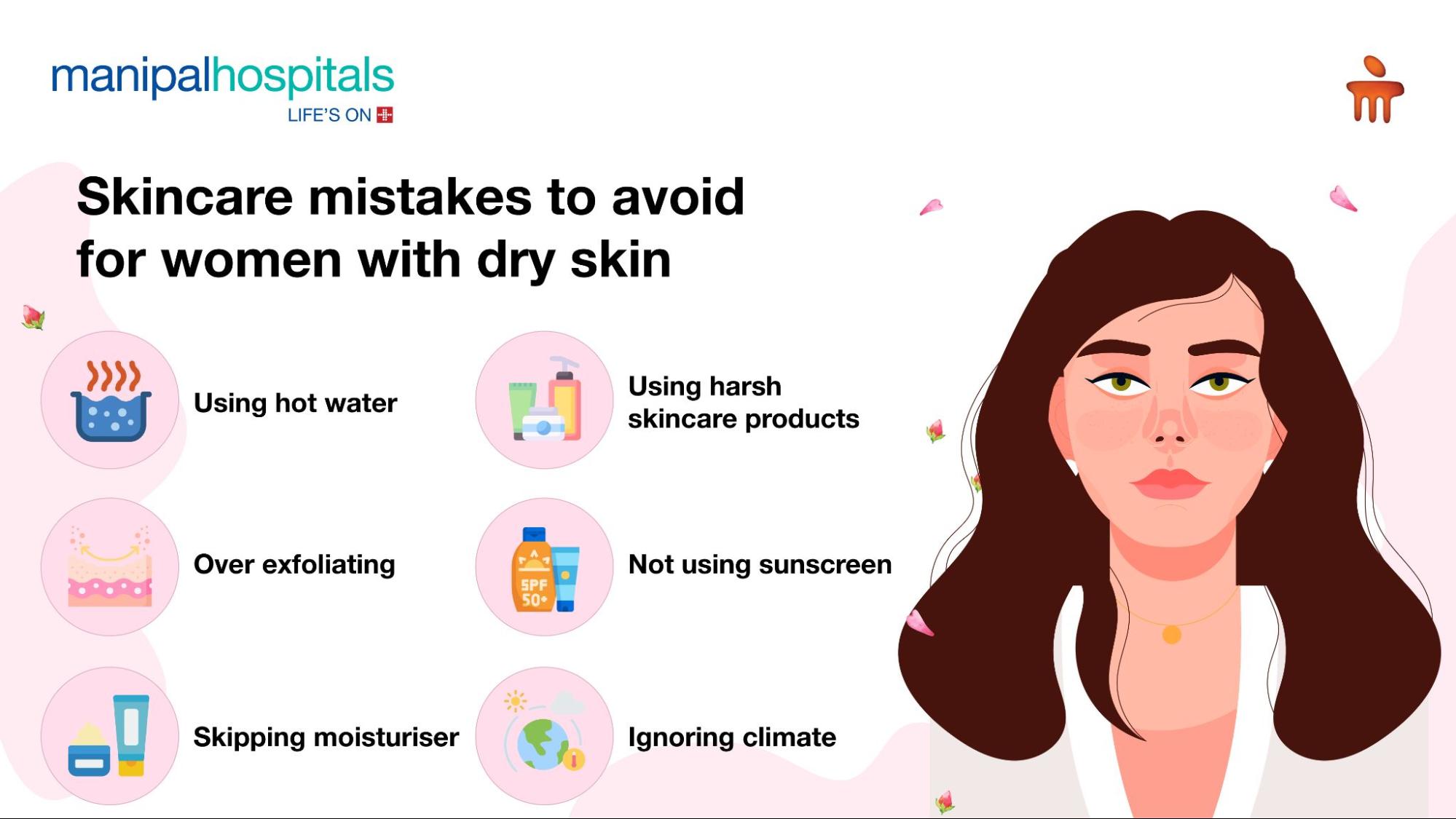Radiant and glowing skin is every woman’s dream, but dry skin scaling or patches can make it challenging. Dry skin, also known as xeroderma or xerosis, is a common skin condition that almost everyone experiences at least once in their lifetime. Interestingly, the prevalence of dry skin is higher in women than in men. This blog will guide you on how to avoid dry skin, its causes, and dermatologist-approved common skincare mistakes that should be avoided for managing dry skin effectively.
Synopsis
About Dry Skin
Dry skin is often characterized by rough, flaky, itchy, or scaly patches. While it can affect anyone, women often face more challenges due to lifestyle and environmental factors. Dry skin tends to worsen in winter, but with the right approach, it can be managed effectively. Following dry skin tips such as proper moisturization and hydration can make a significant difference. If you notice that your dry skin becomes painful or inflamed or does not improve with home remedies, consult a dermatologist for professional dry skin treatment.
Causes of Dry Skin
The loss of water is the main cause of dry skin, and various factors that lead to this include:
-
Heat and climate change
-
Certain occupations
-
Genetics
-
Harsh soaps and detergents
-
Other skin conditions (eczema or psoriasis)
-
Taking more baths or long hot showers
-
Scrubbing skin
-
Medical treatments (cancer, dialysis, certain medications)
-
Medical conditions (diabetes, thyroid, kidney disease)
-
Ageing
-
Dehydration
Consult our dermatology hospital in Bhubaneswar if you need treatment for the above causes and avoid dry skin.
Skincare Mistakes to Avoid for Women with Dry Skin

Here are 6 skin care mistakes recommended by dermatologists that should be avoided to prevent dry skin:
-
Using Hot Water: Using hot water for bathing, washing your face, or taking a long shower strips essential oils and disrupts the skin's pH, making your skin dry and irritated. Instead, opt for lukewarm water and shorter showers, and apply a gentle moisturiser immediately after bathing or washing your face.
-
Over-Exfoliating: Exfoliating skin is good for removing dead skin cells and dry skin flakes, but avoid over-exfoliating, especially if you have dry skin. It can hurt your skin barrier and remove natural oils, causing irritation and exacerbating dryness. Use only a gentle scrub to exfoliate, and do it no more than twice a week.
-
Skipping Moisturiser: Moisturiser is essential to lock in the skin's essential nutrients and moisture. It also forms a protective barrier on the skin, protecting it from environmental stressors. So, never skip using moisturiser, even on hot summer days, irrespective of your skin type. The best time to apply moisturiser is after cleansing or bathing when the skin is still damp.
-
Using Harsh Skincare Products: Using toxins-enriched or harsh skincare formulations not meant for your skin type can cause itchiness and dryness by removing essential oils from your skin. Dermatologists recommend using gentle, non-foaming, fragrance-free, or natural skin products meant for your skin type.
-
Not Using Sunscreen: Sunscreen is crucial to protect your skin from the damage caused by the sun’s harmful UV rays, which can cause many skin issues like dryness, wrinkles, and skin cancer. A sunscreen with SPF above 30 is recommended, and don’t forget to use sunscreen on cloudy or overcast days, as the sun’s UV rays can still damage your skin’s hydration levels.
-
Ignoring Climate: Environment and climatic conditions like low humidity levels can affect your skin by removing the desired moisture, making your skin even worse. To protect your skin from extreme dryness in the winter months, use a humidifier in your home, as it maintains optimal moisture levels in the air.
Consult our dermatologist in Bhubaneswar if you want to know more about how to avoid dry skin and get a personalised skin care routine for dry skin.
Conclusion
Effectively managing dry skin, especially during winter, requires avoiding common mistakes and following a dermatologist-approved routine. By incorporating dry skin tips and avoiding practices that worsen dryness, women can achieve healthier and more radiant skin. However, if your condition persists or worsens, consult the dermatology experts at Manipal Hospitals, Bhubaneswar. Our specialists can provide personalised advice and recommend treatments tailored to your specific needs.
For more guidance on how to avoid dry skin on the face or other concerns, book an appointment today. Visit our blog page regularly for more updates on skin health and care.
FAQ's
Yes, you can have dry skin or dry-to-normal skin, but you will need to take good care of your skin by using the right products and formulations made for your skin type.
You can keep your skin hydrated by drinking at least 7-8 glasses of water daily. Also, avoid the consumption of caffeine and alcohol, as they can disrupt your body’s hydration levels, impacting your skin’s overall health.
Yes, getting enough vitamin E is essential for keeping skin healthy and moisturised. That's why it's a common ingredient found in many skincare products. You can take it as a supplement or through foods such as sunflower seeds.
Coconut oil is perfect for dry skin treatment, as it nourishes dry and cracked skin and strengthens the skin barrier by replenishing its lost moisture. It can be used by everyone, irrespective of their skin type.
To schedule an appointment at Manipal Hospitals, contact our Dermatology Department or visit our website.



















 5 Min Read
5 Min Read







.png)




